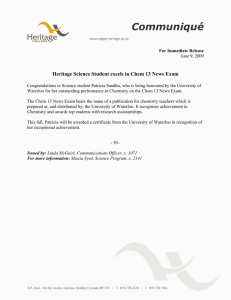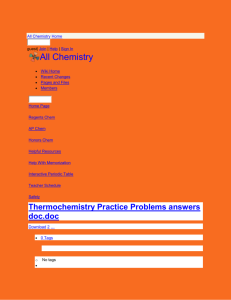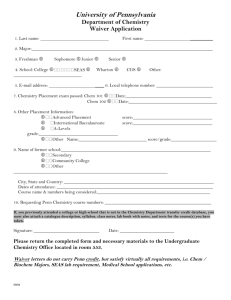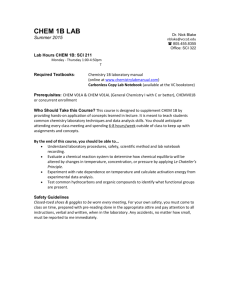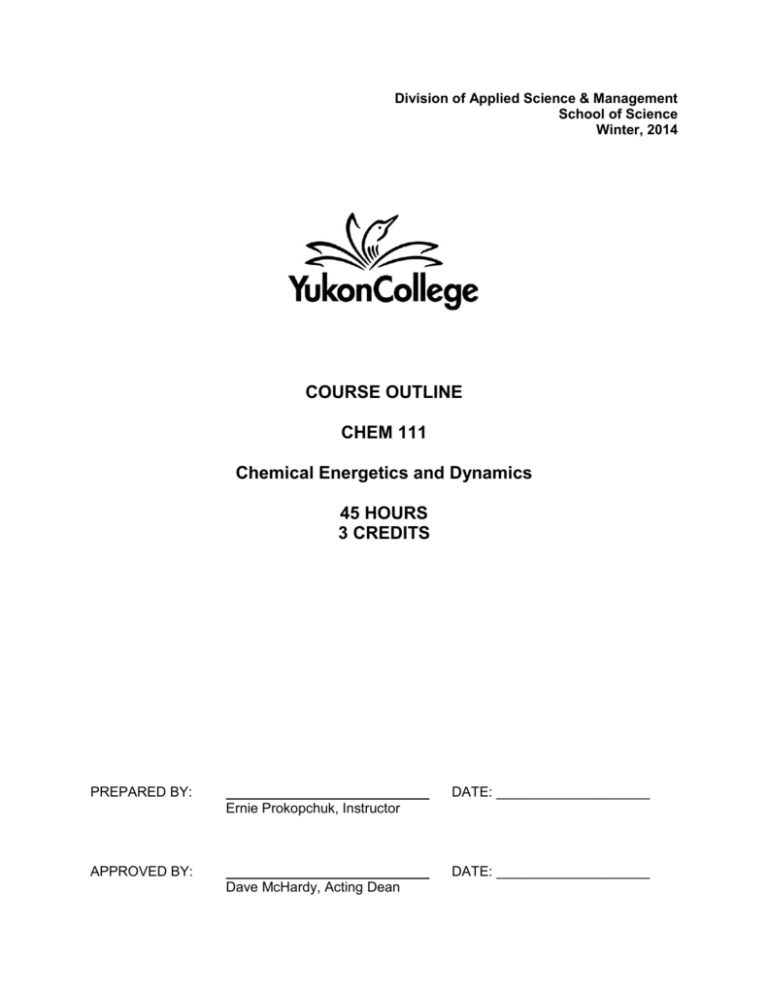
Division of Applied Science & Management
School of Science
Winter, 2014
COURSE OUTLINE
CHEM 111
Chemical Energetics and Dynamics
45 HOURS
3 CREDITS
PREPARED BY:
DATE: ____________________
Ernie Prokopchuk, Instructor
APPROVED BY:
DATE: ____________________
Dave McHardy, Acting Dean
YUKON COLLEGE
Copyright November, 2013
All rights reserved. No part of this material covered by this copyright may be reproduced or
utilized in any form or by any means, electronic or mechanical, traded, or rented or resold,
without written permission from Yukon College.
Course Outline prepared by E. Prokopchuk, November 29, 2013.
Yukon College
P.O. Box 2799
Whitehorse, YT
Y1A 5K4
Division of Applied Science & Management
CHEM 111
Credit Course
Winter, 2014
CHEM 111 - CHEMICAL ENERGETICS AND DYNAMICS
INSTRUCTOR:
Ernie Prokopchuk, PhD
OFFICE HOURS:
Friday 9:30 am – 12:00 pm, or by appointment.
*Open door policy is in effect outside of these office hours.
OFFICE LOCATION:
A2513
TELEPHONE/E-MAIL:
668-8865
eprokopchuk@yukoncollege.yk.ca
Classes:
Room:
Tues. and Thurs., 10:00 am - 12:00 pm
TBD
Lab:
Room:
Monday, 1:00 pm – 4:00 pm
A2803
COURSE OFFERINGS
DAYS & TIMES:
COURSE DESCRIPTION
This course is a continuation of the study of the fundamental principles of chemistry with
an emphasis physical chemistry. Topics of study include chemical equilibrium,
acid/base chemistry, chemical kinetics, nuclear chemistry, thermodynamics and
electrochemistry. The course also includes some descriptive chemistry of a selection of
main group elements and transition metals. The mandatory laboratory component of the
course will illustrate and reinforce most of the topics presented in the lectures.
Successful completion of this course and its companion CHEM 110 will satisfy the
requirement for 6 credits of first year chemistry in the science and engineering degree
programs at most Canadian and US universities.
LEARNING OUTCOMES
Upon successful completion of this course, students will:
- be able to understand and apply fundamental chemistry concepts.
- have developed critical thinking skills.
- have developed basic laboratory skills.
COURSE FORMAT (3-3-1)
Lectures:
Three hours per week.
Labs:
Three hours per week.
Students are required to attend all labs unless excused by the instructor for valid
reasons. More than one unexcused absence from a lab will normally result in a failing
grade for the lab and for the course.
Tutorials: One hour per week, incorporated into the lecture times.
The focus in the tutorials is on solving problems and reviewing assigned study materials
and problems. The instructor will be available for additional assistance on an individual
basis. Tutorial time will be blended into the lectures in order to coordinate examples with
the lecture material.
COURSE PREREQUISITES and CO-REQUISITES
Chemistry 110, or Chemistry 12 (at least 70%) and Mathematics 12, or permission of
the instructor
Students are expected to come to this course with an understanding of the topics
covered in Chemistry 110 as many of these basic concepts will serve as the foundation
for this course.
COURSE REQUIREMENTS/EVALUATION
Term test 1 (60 minutes)
Term test 2 (60 minutes)
Assignments
Exam (3 hours)
Laboratory
Total
15%
15%
10%
30%
30%
100%
Students must get at least 50% in both the laboratory and the lecture component
in order to pass the course.
Attendance
Attendance is not graded but regular attendance is necessary in order to succeed in any
university-level course.
Assignments
There will be at least 8 assignments. Assignments will involve a number of questions or
problems related to the course material. These will be made available at least one
week in advance of the due date. Any assignment handed in late will have 10% of the
total value deducted from the mark for every day late (Saturday & Sunday count as a
single day). Late assignments will not be accepted (receiving a mark of 0) once graded
assignments have been returned to the class.
Tests and Examinations
There will be two 60-minute term tests (February 6, 2014 and March 11, 2014) held
during scheduled class time. Please note that after the term tests the remaining class
time will be used for a lesson. The final examination will take place during Final Exam
period (April 14 – 25, 2014). The exam date will be announced as soon as it is known.
Please note: discretionary travel is not a valid excuse to miss the final exam!
Laboratory component
The labs are a mandatory component of the course. Unauthorized absence from a lab
will result in a mark of zero for that lab. Three unauthorized absences from labs will
normally result in a failing grade for the lab component and a grade of F for the course.
Expectations for the labs are outlined in the lab manual.
Plagiarism
Plagiarism involves representing the words of someone else as your own, without citing
the source from which the material is taken. If the words of others are directly quoted or
paraphrased, they must be documented according to standard procedures. The
resubmission of a paper for which you have previously received credit is also
considered an academic offence.
Plagiarism (academic dishonesty) is a serious academic offence and will result in you
receiving a mark of zero (F) on the assignment or the course. In certain cases, it can
also result in dismissal from the college. And do not underestimate the impact such a
situation will have on your reputation.
STUDENTS WITH DISABILITIES OR CHRONIC CONDITIONS
Reasonable accommodations are available for students with a documented disability or
chronic condition. It is the student’s responsibility to seek these accommodations. If a
student has a disability or chronic condition and may need accommodation to fully
participate in this class, he/she should contact the learning Assistance Centre (LAC) at
(867)668-8785 or lassist@yukoncollege.yk.ca.
REQUIRED TEXTBOOK(S)
Chemistry, Second Canadian Edition by Olmsted, Williams, and Burk is the required
textbook. It will be available in the bookstore in a “binder-ready” format bundled with the
student solutions manual.
* If you have an older textbook from taking CHEM-110 prior to 2013, it may be possible
to use it again for this course. Please contact me to confirm.
Laboratory Manual for Chemistry 111 (available at the first lab session)
EQUIVALENCY/TRANSFERABILITY
Course transfer as of November 2013:
UBC
UBCO
UVIC
UNBC
SFU
TRU
UAF
UAS
UR
With CHEM 110 = CHEM 111 (4) + CHEM 113 (4)
With CHEM 110 = CHEM 111 (3) + CHEM 113 (3)
With CHEM 110 = CHEM 101 (1.5 units) + CHEM 102 (1.5 units)
CHEM 101 (3) + CHEM 121 (1)
CHEM 122 (2) – Q + CHEM 126 (1) - Q
CHEM 1200 (3)
CHEM 106X (3)
CHEM 106 (3)
CHEM 102 (3)
On the strength of these transfer agreements the course will likely transfer to many
other universities with which we do not maintain formal transfer agreements. For more
information about transferability contact the Applied Science office.
See the website http://bctransferguide.ca/ for a more complete list of transfers within
British Columbia, including to university colleges.
SYLLABUS
Week
Chapter
1, 2
14
2, 3
15
4, 5
16
5, 6
13
7, 8
3
6
8
9, 10
12
14
11, 12
17
Topic
Chemical Equilibria – equilibrium condition, equilibrium constant,
applications, Le Chatelier’s Principle
Acid-Base Equilibria – definitions, strength, pH, polyprotic acids,
ionic acids and bases, Lewis acids and bases
Applications of Aqueous Equilibria – buffers, titrations and pH
curves, solubility, complexation
Chemical Kinetics – rates, rate laws, reaction mechanism, catalysis
Thermochemistry – energy, thermodynamics, enthalpy, Hess’ Law
enthalpies, energy sources
Bond energy
Phase changes
Spontaneity, Entropy and Free Energy – spontaneous processes,
2nd law of thermodynamics, entropy changes in reaction, free
energy and reactions
Thermodynamics and equilibrium
Electron-transfer Reactions – balancing redox reactions, galvanic
cells, standard reduction potentials, cell potential, applications
13
20
Descriptive main group chemistry
*There may be some variation to chapters covered in each week depending on how the
term develops.
IMPORTANT DATES
January 7, 2014
First class
February 6, 2014
Term Test 1
March 11, 2014
Term Test 2
March 14, 2014
Last day to withdraw without academic penalty
March 17- 21, 2014
Reading week (no classes and labs)
April 11, 2014
Last day of classes
April 14 – 25, 2014
Examination period



